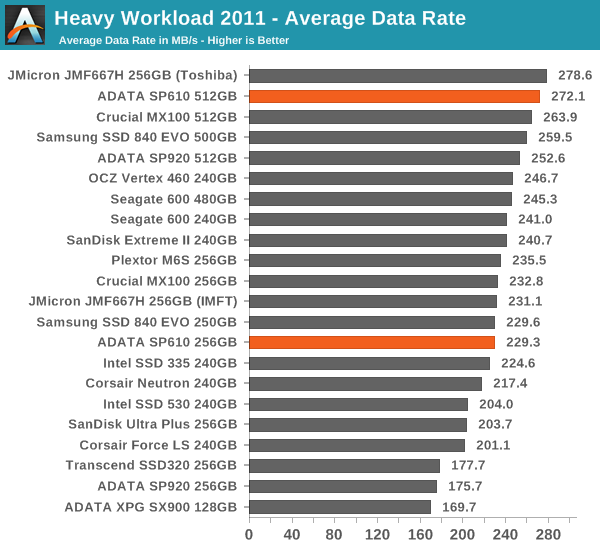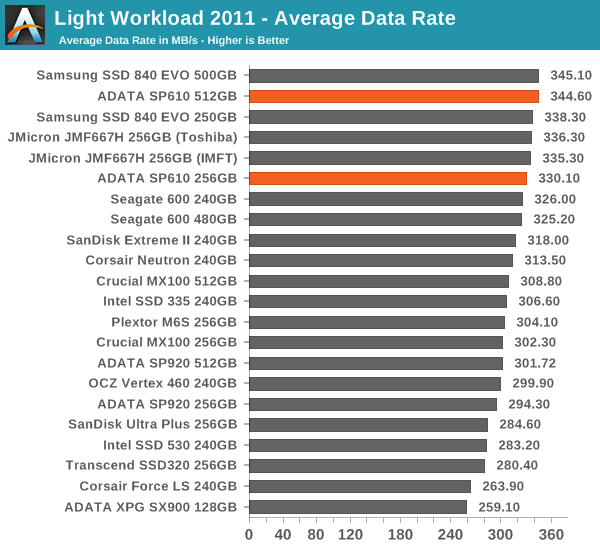ADATA Premier SP610 SSD (256GB & 512GB) Review: Say Hello to an SMI Controller
by Kristian Vättö on June 27, 2014 2:00 PM EST- Posted in
- Storage
- SSDs
- ADATA
- SP610
- Silicon Motion
AnandTech Storage Bench 2011
Back in 2011 (which seems like so long ago now!), we introduced our AnandTech Storage Bench, a suite of benchmarks that took traces of real OS/application usage and played them back in a repeatable manner. The MOASB, officially called AnandTech Storage Bench 2011 - Heavy Workload, mainly focuses on peak IO performance and basic garbage collection routines. There is a lot of downloading and application installing that happens during the course of this test. Our thinking was that it's during application installs, file copies, downloading and multitasking with all of this that you can really notice performance differences between drives. The full description of the Heavy test can be found here, while the Light workload details are here.

The SP610 also does well in our old Storage Bench. It's about equal to the MX100 and 840 EVO, although I'm still surprised how well the JMF667H performs with Toshiba NAND. In the Light Workload test the SP610 is actually a bit faster than the MX100 but I wouldn't get too excited about a 10% difference.











24 Comments
View All Comments
nicolapeluchetti - Friday, June 27, 2014 - link
Has anyone any idea on why the Samsung SSD 840 Pro is so bad in Anandtech Bench 2013 and so good in 2011? Here is the link it did 142 in 2013 http://www.anandtech.com/show/8170/sandisk-extreme... Nut in 2011 it's number 1 http://www.anandtech.com/show/8170/sandisk-extreme...How is this possible?I mean are the workloads so different?Did Samsung optimize the controller for the test?
WithoutWeakness - Friday, June 27, 2014 - link
The 2013 Bench is definitely different enough to have different results for a given drive. More detailed info on the differences between the 2011 and 2013 benches can be found here: http://www.anandtech.com/show/6884/crucial-micron-...Muyoso - Friday, June 27, 2014 - link
Yea, I bought the 840 Pro on the basis of that 2011 test bench, and now everytime I see an SSD review I am sad to see how ravaged it gets vs the competition.CrystalBay - Friday, June 27, 2014 - link
I wouldn't worry about the 840P it still a top drive with excellent support . Come this September Samsung is going bring out some new drives. I'm very curious about what's next from them.Kristian Vättö - Friday, June 27, 2014 - link
Maybe September is coming sooner than you think ;-)CrystalBay - Friday, June 27, 2014 - link
Oh what a nice surprise ! can't wait....Galatian - Saturday, June 28, 2014 - link
Which answers my question wether I should get the XP941 now for my ASRock Extreme9 or wait ;-)Khenglish - Friday, June 27, 2014 - link
It has to do with how the 840Pro handles garbage collection. Basically the way the 2013 test is structured the 840Pro delays far longer than it should before reorganizing itself, but the 2011 test is less stressful in this regard. This means that the 840Pro is a very fast drive if you don't have it running at 100% at all times, but if you are then other drives are likely preferable.althaz - Sunday, June 29, 2014 - link
The 2013 test is more enterprisey. The 2011 test is a better indicator of performance if you half-fill your SSD and use it for your OS plus a few core apps. If you fill it up and use it for everything, the 2013 test is more useful.nitro912gr - Friday, June 27, 2014 - link
I can find the evo 840 250GB at the same price with that adata sp610, should I go with the later since it is bundled with the 3.5" case?I can't see much more difference aside that.